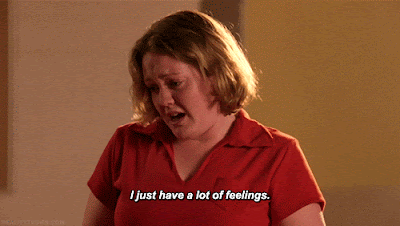★★★★★
source: e-galley from Macmillan
publication: October 6, 2015, Henry Holt
**all quotes are from uncorrected proof**
HERE IS A REVIEW WITH, LIKE, ACTUAL WORDS, I GUESS. [spoiler-free]
Here's something you should know about me: the number of playlists I have for a book is directly related to how much I loved that book. My favorite book, which I read for the first time more than two and a half years ago, has since claimed 182 songs and 15 playlists in my iTunes library. I should mention that some of those playlists and songs go with the sequels, because that is relevant to what I'm about to tell you.
Six of Crows does not have a sequel yet*. I did not read Six of Crows two and a half years ago; I finished it four days ago.
It already has 9 playlists and 57 songs.
If that does not tell you enough, here are some additional thoughts:
Six of Crows is an edgy whirlwind heartbreaker of a book. It's a fantastical, gritty, emotional story about not one, not two, but six three-dimensional characters, every one of whom feels like a real person. It's a heist story, a resilience story, and a story about the vanishing line between human and monster. (I can already tell you that one of the most popular quotes of the book will be "We're all somebody's monster.")
"When everyone knows you're a monster, you needn't waste time doing every monstrous thing."
The characters and their relationships were my favorite thing about this novel, but I don't want to say too much about them because I think the experience of getting to know them made me all the more attached. I will say that they're a bunch of Weebles, you guys. They've spent most of their lives wobbling in one way or another, but they refuse to fall down. Two of them are dealing with a betrayal that cost them everything. One of them is hiding severe PTSD after a traumatic and heartbreaking experience. One is tired of always being someone else's property. One is a gambler whose loose lips get him in trouble, and the last is a runaway from a life of privilege and secret pain.
There was no part of him that was not broken, that had not healed wrong, and there was no part of him that was not stronger for having been broken.
And they have not stopped fighting for what they want, whether it's revenge, freedom, love, or acceptance. It turns out that Weebles make for really gripping characters.
So, what brings this eclectic cast of people together? Well, Kaz Brekker, of course. He's assembled this talented crew for business purposes: a man came to see him about an impossible heist that will either get them killed or win them a life-changing sum of money, and who is Kaz Brekker to turn down a deal like that?
The heist has something to do with Grisha and brings about moral debates between some of our characters, but I won't go into detail because the synopsis is similarly vague. I will say it's a new side of the Grishaverse, because now we're in a part of the world where Grisha are something to be used, not revered or respected. The novel then takes us to another part of the world that believes they are monstrosities, that their existence is wrong and must be corrected. This is the central conflict between two of the protagonists, one of whom is a Grisha and one of whom was conditioned to believe all Grisha are evil, and it's a beautiful Jongritte-esque situation if I ever saw one.
There's not quite as much magic in this one as there was in any of the original Grisha books, but that's okay because when it is used, it's used perfectly. Alina Starkov's journey was, in a way, defined by magic: when she found her magic, she found her power, but losing her magic was ultimately how she kept her power**. In Crows, magic and power are inversely linked; characters who have magic must choose how to be powerful despite it, which is a really interesting flip of the dynamic, and I actually think the unconventional approach made for more nuanced character development.
Another thing I loved about this book (okay, I loved everything, shut up) was the strategy behind everything that happened. Kaz is like a male, criminal, slightly more underhanded version of Kestrel from The Winner's Curse, so he's always ten steps ahead of everyone else and he uses any information he can get (thanks to Inej) against someone if he has reason to. He can usually think of a reason to.
Kaz cocked his head to one side, his eyes focused on something distant.
"Scheming face," Jesper whispered to Inej.
God, I love him. Kaz is the antihero I think everyone wanted the Darkling to be (or is still pretending the Darkling was). I could talk to you about Kaz Brekker for days without interruption. But while he may be the one I feel strongest about, he is by no means the only one who had me basically writhing with emotions. Hence, the playlists. 57 songs in 4 days. You do the math.
When I finished the book, I was all
and Leigh Bardugo was all
So congratulations, Bardugo, you have ruined me. In the best way possible.
*at least not one I have read because, hi, this book isn't even out for another 5 months.
**by which I mean, her power over her own life, which is the only kind of power Alina actually wanted and the only kind that's relevant to the main six in Crows.







